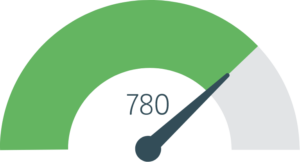6 ways Canadians can get out of debt and build credit

With household debt on the rise in Canada, it's time to take a look at some of the causes. Why do Canadians find themselves buried in debt? How do you manage debt and build up your credit score?
Here are some proven ways to take control of your debt and build a positive financial future.
1. Use your credit card properly
This is probably the most common cause of consumer debt. Instead of using a credit card as an alternative method of accessing your money, you may be using it to expand your spending capacity. This can get you in big trouble!
The easiest thing to manage is your spending. If you're using your credit card for day to day spending, ensure that you make your monthly payments on time to avoid high-interest rates. Also, stay well below your credit limit — keep your credit utilization below 30%. The credit utilization ratio is the amount of credit you have used to the amount you have available. Keeping it on the lower side will help you sustain a get credit score.
Learn more about how you can be strategic with your credit card usage.
2. Pay more than your minimum monthly payment
If you carry the average credit card balance of $15,000 with a typical 15% APR and make the minimum monthly payment of approximately $600, it will take you close to 13.5 years to pay off the money you owe! Debt relief won't be anywhere in sight. And that’s only if you don’t keep spending extra money and adding to the balance, which can be a challenge all on its own.
Whether your money on your credit card, personal or student loans, pay them off by making more than the minimum monthly payment. Doing this will help you save on interest throughout the life of your card or loan, and it will also speed up the payoff process. To avoid any potential headaches, make sure your loan doesn’t charge any prepayment penalties before you get started.
3. Make payments on time
Missed payments mean late fees and could even lead to your account being sent to collections, where interest will pile up on you. Also, missed and late payments will end up on your credit report with the credit bureaus. Before you know it, you'll be in more debt than you can handle. Your negative payment history will damage your credit score, and a poor credit history means you're considered a credit risk to lenders. If you’re not sure where you currently stand with your credit score, Refresh can check it for you for free.
It goes without saying that paying your bills on time is a big deal! One easy way to make sure you pay your bills on time is to set a reminder on your phone. Another is to set up automatic payments on specific days — that way you can relax knowing you'll never miss a payment again. Most financial institutions have payment reminder apps and tools that you can use to avoid late or missed payments.

4. Have an emergency savings fund
Whether you've lost your job or your car needs repairs, an emergency can send your finances into a tailspin. This is why most of us rely on our credit cards for emergencies.
Save for an emergency fund, instead of going into debt. Start small. This can be as little as putting aside $20 a month. Build up your savings so you have about three to six months’ worth of your financial obligations. That way if you lose your job or your car breaks down, you're still going to be able to make all your payments. It's one of the best ways to manage debt and build credit.
5. Give up your expensive habits
If you’re in debt and consistently coming up short each month, evaluating your habits is a great place to start. No matter what, it makes sense to look at all the ways you’re spending money daily. If you don't track your spending, you won't know where it all goes. If you do track it, you can evaluate whether those purchases are worth it — and come up with ways to minimize or get rid of them.
6. Ask for a lower interest rate on your credit card
If your credit card interest rates are so high it feels almost impossible to make headway on your balances, it’s worth calling your card issuer to negotiate. Asking to have your interest rates lowered is quite commonplace. And if you have a good history of paying your bills on time, there may be a good chance of getting a lower interest rate.
Remember, that the worst anyone can say is no. The less you pay for your fixed expenses, the more money you can put towards your debts. If you haven’t used a budgeting app before, give it a try. It will help you budget your household expenses, prevent overspending, get you out of debt, and encourage you to grow your savings. Take a look at PocketGuard and start organizing your bills and save money.
Avoid causing yourself more stress and start creating a bright financial future by being proactive and following these guidelines.
To continue to learn about managing your debt and credit score wisely, follow Refresh’s Financial Blog.
*******
Refresh financial offers custom credit building solutions to help you build your credit score FAST.







Leave a Reply